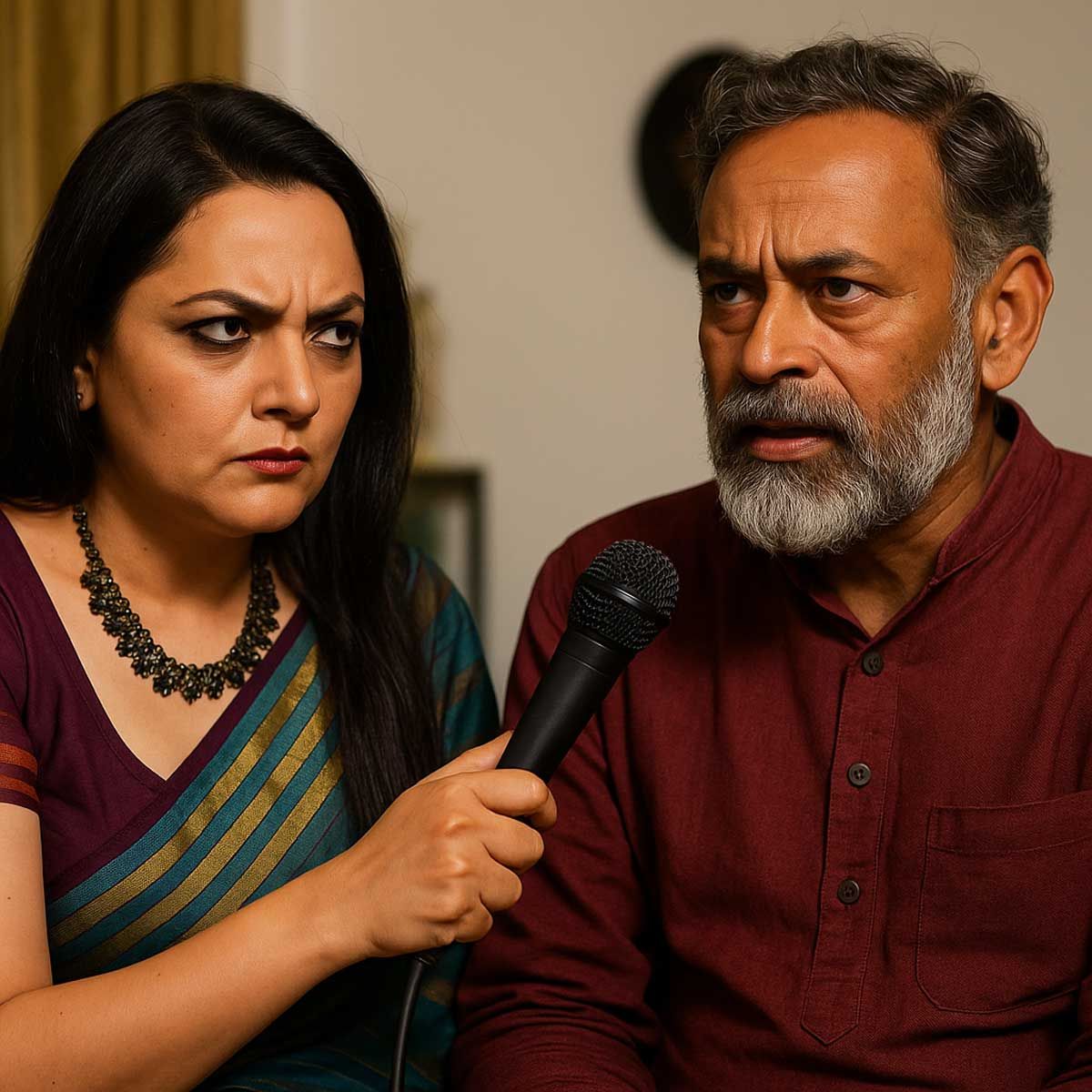More Coverage
Twitter Coverage
Satyaagrah
Written on
Satyaagrah
Written on
Satyaagrah
Written on
Satyaagrah
Written on
Satyaagrah
Written on
JOIN SATYAAGRAH SOCIAL MEDIA
A sudden surge of Land Jihad in Gujrat is forcing Hindus and Jains to leave their homes resulting in localities to shift demography: A tale of two cities, Gopipura in Surat and Soni Falia in Bharuch
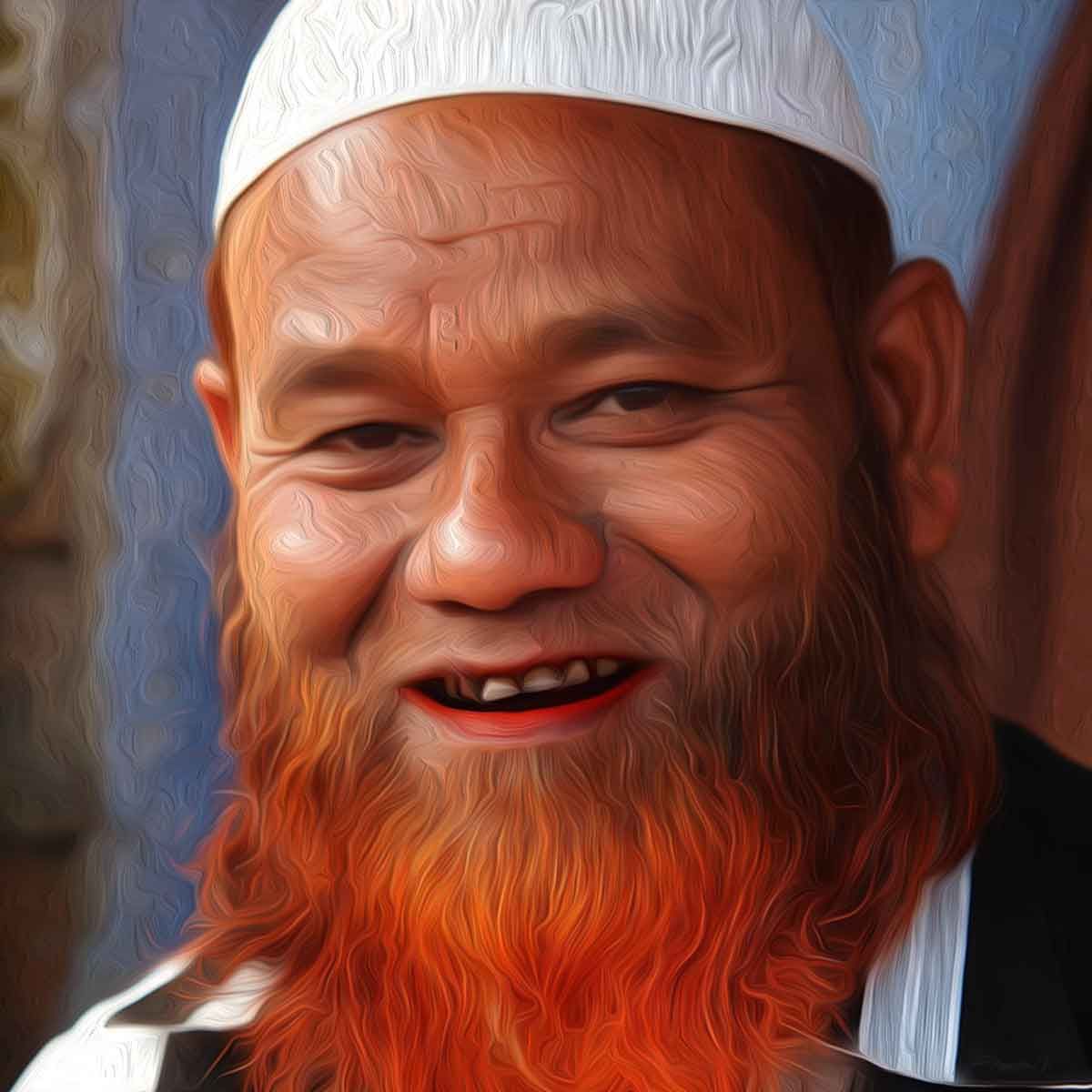
In 2014, a Jain Sadhvi who stayed in Surat’s Gopipura area wrote a letter to the President of India, Governor of Gujarat, Prime Minister Modi, the then Chief Minister of Gujarat, Anandiben Patel, and other leaders about the harassment she was facing in Gopipura, a traditionally Jain locality in Surat, which has slowly turned into a Muslim majority area.
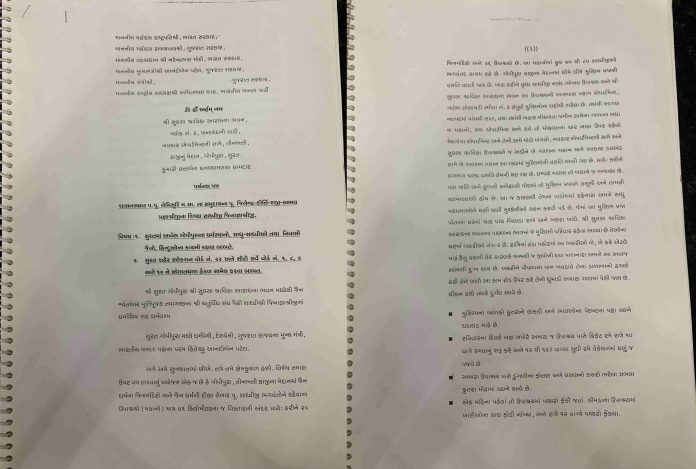 Letter by a Jain Sadhvi |
In the letter, the Sadhvi had written how near the Upashrays where Jain Sadhvis stay in Gopipura, there are around 25 Jain temples and 35 Upashrays within a 1 km radius. About 70-80 Jain Sadhvis were staying in this place. The Sadhvi pointed out that slowly the area has seen more and more Muslim residents come and live there. “Especially near the Nanand Bhojai Upashray and Shri Sulasa Shravika Aaradhna Bhawan, apartments like Parag Apartments, Ganesh Society, Smita Apartment no. 3 – all residents here are now Muslims. Further, Navpad 5-7, Yash Apartments and other apartments like Meghganga, Navkar, Akash Diamond all now have Muslim residents. About 50% residents in the area are now Muslims,” the letter stated.
The Sadhvi in her letter had stated that God has made all living beings the same but Muslims have very ‘tamsic and janooni‘ (aggressive, to put it mildly) and the Sadhu-Mahatma are facing difficulties. “Some Muslim families keep 4-5 cats and goats. Near Sulasa Shravika Aaradhana Bhawan, a Muslim family that has come to stay has tied two goats. These goats can be heard crying in middle of the night because of cold. This pains me too much. I have grown up being kind to animals and this kind of suffering of theirs is very painful for me,” she said.
She further added that some Muslim kids would run behind the stray dogs and beat them up with belts and would often leave waste of onion and garlic peels outside their homes. Practising Jains do not consume root vegetables like onion, garlic, potatoes.
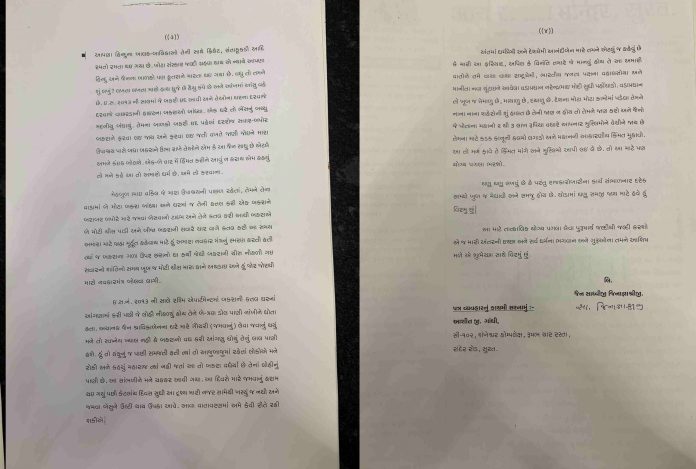 Part 2 of the letter by Jain Sadhvi |
She further wrote that in 2013 during the Bakri Eid, the Muslim families had tied goats in their houses. “One house even tied a baby buffalo. Before Eid, the Muslim kids would come and take the goat for a walk and would deliberately pass them through my Upashray to tease me,” she wrote.
She further narrated an incident involving one Mehboob bhai who got two huge goats and slaughtered one of them in the house right at the time they were sitting down for lunch. The goat cried out very loudly. The other goat was slaughtered the next day at 4 AM. “This is Brahma Muhurat for us and I was reciting my Navkar mantra. That is when I heard the cry of the goat being slaughtered. I started chanting the Navkar mantra very loudly,” she wrote in the letter.
She also talked about another incident from 2013 where she saw bloodied water flowing near the Rashmi Apartment after the slaughter of the goats. “When I was going to a Jain Shravika’s place for lunch, never did I ever think that this red water would be the blood of the slaughtered goat. I thought that water was mixed with kumkum. But people around warned me and told me that it was goat blood. I fainted. I could not get the visuals out of my mind. I feel extremely nauseated. How can I live like this?” she said.
She appealed to PM Modi to bring in strong laws so that those who sell their homes to Muslims for Rs 2-3 lakhs more do not do so to prevent such demographic change.
Many such letters, appeals were sent to the state and central administration by people from various pockets of the state which eventually culminated in the Disturbed Areas Act. The Sadhvi who wrote the above letter tried to commit suicide but was thankfully saved.
It is notable here that there are laws regarding the slaughter and proper disposal of animals. The open slaughter of animals in residential areas, especially during Bakri Eid has been a contentious issue in many parts of the country.
Disturbed Areas Act
Gujarat Prohibition of Transfer of Immovable Property and Provisions of Tenants from Eviction from Premises in Disturbed Areas Act, 1991, or Disturbed Areas Act as it is popularly known as was passed in the Gujarat state assembly in 2019 and the President of India gave his assent in October 2020. The Act was initially introduced in Ahmedabad in 1986 after the communal riots under the Congress-ruled Madhavsinh Solanki government. There was large-scale distress sale of immovable properties in parts of the city.
Disturbed Areas Act is implemented in a particular police station area. The District Collector calls upon the Police Commissioner to inquire about communal harmony and if there are any complaints of polarization of communities. The Police Commissioner then will inquire about the same to all police stations under his jurisdiction. Upon receiving information, he notifies the District Collector, who will then declare a particular area (area under particular police station’s jurisdiction) as a Disturbed Area for a period of five years which can later be renewed.
Gopipura ‘is this house for sale?’ viral video
Sometime back a video had gone viral on social media where a burqa-clad woman can be seen knocking on doors and asking the resident if the house he is living in was up for sale.
|
The woman was reprimanded by the resident who denied any reports of having put his house up for sale.
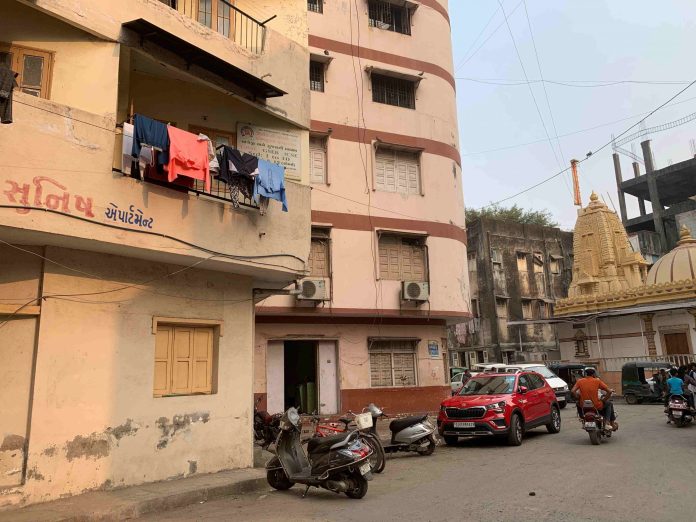 Sunish Apartments, Gopipura |
The above video was recorded on the CCTV camera of one of the residents of Sunish Apartments. There is a Jain Derasar right across the flats. In about a 1 km radius, there are at least 30 such Jain temples and places of worship. However, in past few years, the area, which was predominantly a Jain locality has seen a drastic demography change. Many apartments which were owned by Jains were purchased by Muslims and residents now say that about 50% population in the area is now Muslims.
One of the residents of Sunish Apartment, on condition of anonymity, said that things started changing about 15-20 years back. “Mahavir, Pinal, Navkar, Ganesh, Nirav, Pancharatna, Rangkala, Swati apartments, they were all owned by Jain families. But now all these flats are having Muslim residents. We are Jains. Neighbors cook nonvegetarian food and the smell is so overpowering that we cannot go inside the kitchen after 6 PM,” she said.
Jainism objects to the consumption of non-vegetarian food as the faith propagates not injuring any living being, knowingly or unknowingly. Eating non-vegetarian food is an act of himsa (violence) as per Jain's philosophy.
The Sunish resident further talked about the harassment faced by them, especially women and young girls in the neighborhood. “Some three years back, one of the girls who lived here was harassed. The family left the house within a week. Six months back, my own daughter faced harassment outside the temple. We are tired of this. There is a school right across this apartment, Shri Ratnasagar School. Now, most of the students studying there are Muslims,” she said.
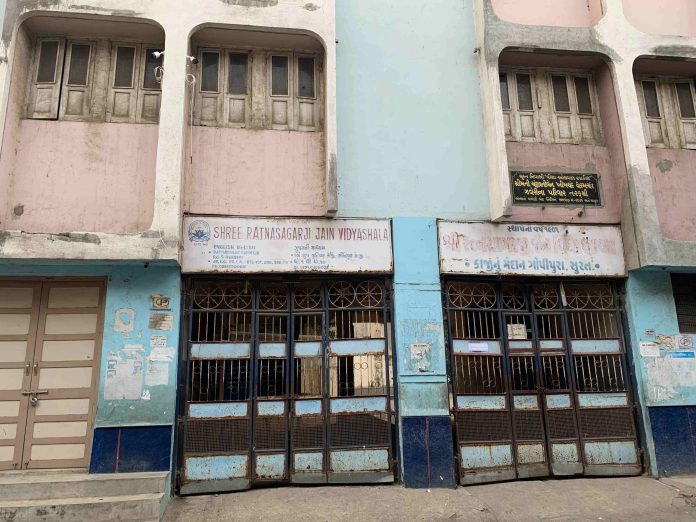 School across Sunish Apartment in Gopipura |
“There has been a steady growth of Muslim population nearby and hence we want to go from here,” she said. About 12 of these 14 flats in Sunish Apartment are now sold off, most of them are sold to Muslim buyers. However, sources said that the sale deal circumvented the Disturbed Areas Act provisions and hence the deal may likely be cancelled.
Back in 2014, multiple media reports had highlighted the challenges faced by residents of Gopipura.
 Divya Bhaskar news clipping from 2014 |
As per a 2014 report in Gujarati daily Divya Bhaskar, a Jain girl was lured into a relationship and then a video clip in a compromising position was made viral. Another woman had said that her viral video had reached relatives in Mumbai and her engagement broke because of it. Such threats of making videos viral had made the lives of women living there difficult. One prominent resident of the area had then alleged that these kinds of things were done to harass the Jains living in the locality so that they leave their homes.
Another resident of Gopipura spoke about a dargah nearby (which is quite popular and pegged as the epitome of harmony amongst Hindus and Muslims in many mainstream media reports), where most of the people in surrounding areas are illegal Bangladeshi immigrants. He said that many people around the dargah who roam around with dhoop are all illegal Bangladeshi immigrants. The dargah there gives shelter to these men, he said. “Administration is aware, but ignores,” he said.
Soni Faliya in Bharuch
Similar has been the case of Soni Faliya in Bharuch. The media had earlier reported that Hindus in the locality had put up ‘for sale’ banners in Soni Faliya in Bharuch.
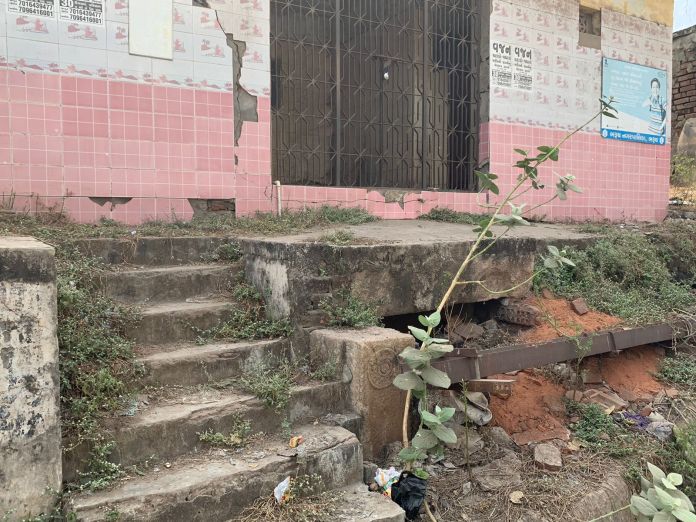 Public toilet outside Soni Faliya |
Local residents point out the absolute indifference towards the rich heritage of the ancient cities of Gujarat. Bharuch is one of the ancient cities of Gujarat which has also found mention in the Skanda Purana. However, it is in a deteriorating state now. Above is an image of a public toilet right outside Soni Faliya in the old city of Bharuch. If you look closely you could see carvings on the stones that form the base of the toilet. These huge slabs of stones with carvings, instead of being preserved as ancient heritage, are left to rot.
“Archeological Survey of India should carry out survey and excavations of this city and make an effort to preserve the ancient city,” said a source who has been involved in various cases of forced religious conversion.
When you enter the lane across the public toilet, it takes you back in times when people lived in ‘walled cities’.
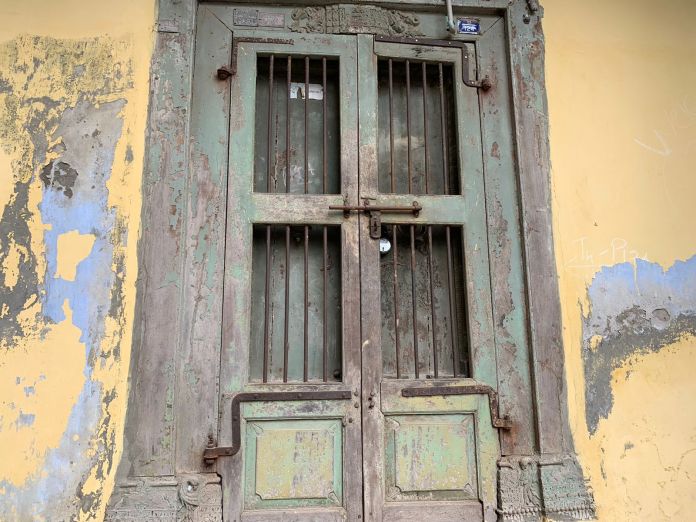 Locked house in Soni Faliya |
But some of the houses in this locality are locked and deserted.
There is a Sai Jalaram temple just a few metres away from here. When some Muslims purchased the houses surrounding the temple, they started opposing the evening Aartis in the temple, the local residents allege. They were told that Bhajan is haram and hence must be stopped.
Right next to it is a Shiva temple, which is at least 150 years old.
All the houses around this temple now belong to Muslim residents.
Residents of Soni Faliya have insisted that despite Disturbed Areas Act being in place, it is now implemented only in spirit. The sources in the know of the matter say that when the residents protested against such taking over of property by exploiting loopholes, police and administration instead threatened to file cases against them accusing them of disturbing the peace.
One of the residents, Gaurang Rana showed me around the lane which now has quite a deserted look. He said that the Muslim families in the neighborhood have exploited loopholes in the transfer of property rules. He said that in some cases, a Hindu buys property from a Hindu seller, and within just months, sometimes as less as two months, the same has been sold to Muslim buyers.
Alleging conspiracy, the residents say that at first one or two Muslims would buy property at a high rate. Then the Hindus in the area get influenced and sell their homes. Later, when the demography changes, the remaining Hindus end up having to sell their property at lower rates because of the change in demography.
One Shaukat Ali, who has purchased the house next to the Shiva temple, has now got more of his relatives to live in the locality. Recently, Rana and two other residents of Soni Faliya got threatening calls and messages from foreign numbers, where a person identifying himself as a Muslim had offered to purchase their homes.
“The area was always peaceful, like any other part of the city. I have grown up here. In the nearby area, I have many Muslim friends I grew up with and went to school with. But in 1992, the same people I called friends, attacked me from this masjid right here and left me to die,” said a former resident of Soni Faliya on condition of anonymity. He said that he was attacked and stabbed 17 times and now considers his survival as ‘second life’.
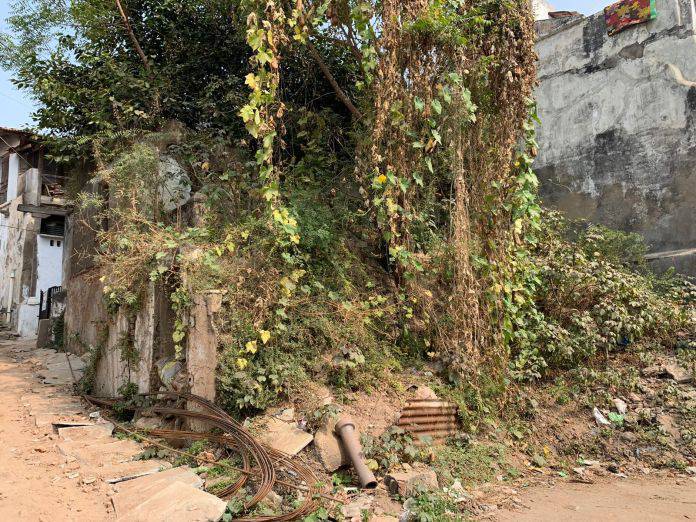 House of Morarji Desai now in ruins |
He, however, laments that the place he grew up is in ruins. “This what you are looking at was once the house of Morarji Desai when he was the Prant Adhikari. The city administration has no interest in upkeeping and preservation of our heritage. So much that this very area has some houses which are considered safe havens during riots,” he said while pointing to a house in the neighbourhood.
There has been an increase in masjids and dargahs in the neighbourhood, where he alleges various anti-social activities, including forced religious conversions are carried out.
“You should go to the Kankaria village in Amod Taluka of Bharuch where people of the tribal community were converted to Islam by luring them. All the support comes from here. Government should trace their funding too,” he said.
An hour later, I was on my way to Kankaria village in Amod.
To be continued…
Note: This is a part of a series of ground reports on forced religious conversion, grooming jihad, ‘land jihad’ and possible nexus with terror funding taking place in Gujarat. You could read previous parts here and here.
References:
 Support Us
Support Us
Satyagraha was born from the heart of our land, with an undying aim to unveil the true essence of Bharat. It seeks to illuminate the hidden tales of our valiant freedom fighters and the rich chronicles that haven't yet sung their complete melody in the mainstream.
While platforms like NDTV and 'The Wire' effortlessly garner funds under the banner of safeguarding democracy, we at Satyagraha walk a different path. Our strength and resonance come from you. In this journey to weave a stronger Bharat, every little contribution amplifies our voice. Let's come together, contribute as you can, and champion the true spirit of our nation.
 |  |  |
| ICICI Bank of Satyaagrah | Razorpay Bank of Satyaagrah | PayPal Bank of Satyaagrah - For International Payments |
If all above doesn't work, then try the LINK below:
Please share the article on other platforms
DISCLAIMER: The author is solely responsible for the views expressed in this article. The author carries the responsibility for citing and/or licensing of images utilized within the text. The website also frequently uses non-commercial images for representational purposes only in line with the article. We are not responsible for the authenticity of such images. If some images have a copyright issue, we request the person/entity to contact us at This email address is being protected from spambots. You need JavaScript enabled to view it. and we will take the necessary actions to resolve the issue.
Related Articles
- Our Sisters and Daughters has to face Hell just because we choose to ignore the reality ourselves - Of fear or favour, we need to understand the reason why Hindu women seldom speak out on the atrocities unleashed upon them in grooming jihad
- How Jihad a fight against the enemies of Islam is turning into every damn thing that kafir knows from love, thook, land, halal to institution one: Story of conversion from Gujarat – Pooja survived to tell the tale
- From changing Muslim identity for luring Hindu girls to black magic, mysterious water in dargahs and sexual exploitation: Grooming jihad horrors from the back of beyond of Gujarat
- Jihad Recruitment going on in Madrassas forced the Assam government to cease hundreds of them
- Tales of Fraud, funding, forced religious conversion and insulting Hindu gods and goddesses after brainwashing: How tribals were converted to Islam in Gujrat - “Aapka paigam London pahucha diya hai, achha kaam ho raha hai"
- Mohammedan man taken prisoner for grooming and holding hostage a 15-year-old Hindu girl, claimed “We are in love for 7 years”: Kasganj, UP
- An attempt of Land Jihad bites the dust as Supreme Court orders 1654 acres of land back to the State Government and that it does not belong to Dargah Hazrat Hussain Shah Wali as Waqf Board claimed
- Devkinandan Thakur's statement is a slap in the face of the Islamist hoodlum from Hyderabad - “Many more Yogis and Modis standing in line…”
- While Shaheen Bagh showcases its latest artwork for anti-CAA 'protest', it also reveals its true nature of Islamist supremacy and Hinduphobia: Adds image of Hindu Swastika being ‘smashed’ and disintegrating
- Waqf board gets stay on demolition of illegal madarsa after Surat Municipal Corporation fails to update records on time, may hijack second property in just 3 months: Land Jihad surges in Gujarat
- If only India’s partition chilling wound was not enough, Gandhi did his last protest again only to blackmail India into giving 55 crores to Pakistan, dragged Hindu, Sikh refugees seeking shelter in mosques to die in cold: And we call him Mahatma, not for
- In yet another horrific incident of grooming jihad Mohammad Yasin, a supplier of ayurvedic medicine killed his second wife ‘Zara’ earlier a Hindu girl 'Shiva Vishwakarma': Left their three-year-old girl child outside the house
- In an attempt of the propaganda against India, an International Toolkit activated in Karnataka Hijab Row: French Footballer Paul Pogba shares post supporting Hijab in colleges
- Qatar-based Sheikh Eid Bin Mohammad Al Thani Charitable Association has been funding millions of dollars to organizations associated with the Wahhabi school of thought since 2008-2009: Earlier accused by the US also for assisting Al Qaeda
- Islamists are raging Land Jihad by encroaching iconic Maharashtra forts through illegal constructions within the premises, falsifying history by inventing fictional characters

















